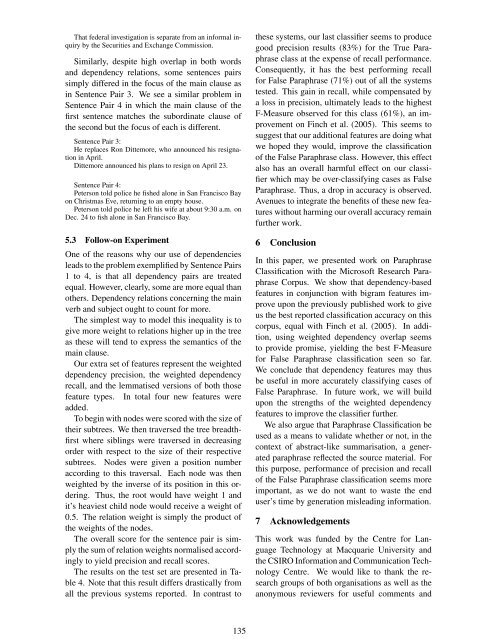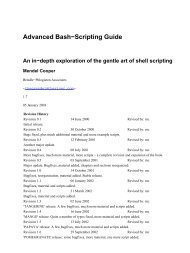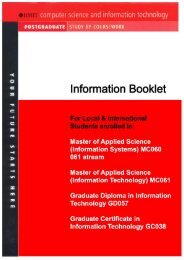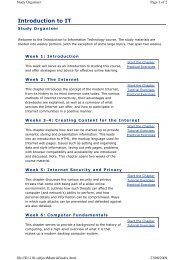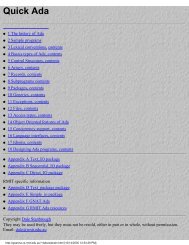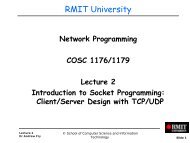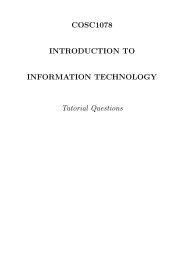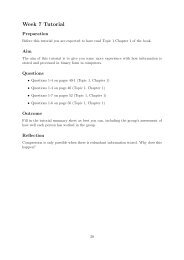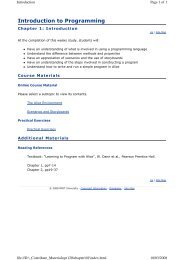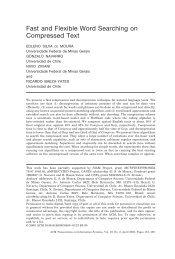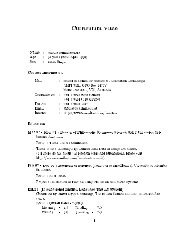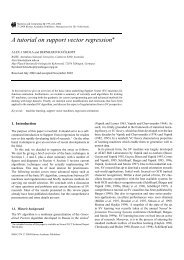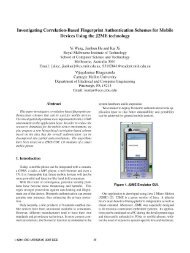Automatic Mapping Clinical Notes to Medical - RMIT University
Automatic Mapping Clinical Notes to Medical - RMIT University
Automatic Mapping Clinical Notes to Medical - RMIT University
Create successful ePaper yourself
Turn your PDF publications into a flip-book with our unique Google optimized e-Paper software.
That federal investigation is separate from an informal inquiry<br />
by the Securities and Exchange Commission.<br />
Similarly, despite high overlap in both words<br />
and dependency relations, some sentences pairs<br />
simply differed in the focus of the main clause as<br />
in Sentence Pair 3. We see a similar problem in<br />
Sentence Pair 4 in which the main clause of the<br />
first sentence matches the subordinate clause of<br />
the second but the focus of each is different.<br />
Sentence Pair 3:<br />
He replaces Ron Dittemore, who announced his resignation<br />
in April.<br />
Dittemore announced his plans <strong>to</strong> resign on April 23.<br />
Sentence Pair 4:<br />
Peterson <strong>to</strong>ld police he fished alone in San Francisco Bay<br />
on Christmas Eve, returning <strong>to</strong> an empty house.<br />
Peterson <strong>to</strong>ld police he left his wife at about 9:30 a.m. on<br />
Dec. 24 <strong>to</strong> fish alone in San Francisco Bay.<br />
5.3 Follow-on Experiment<br />
One of the reasons why our use of dependencies<br />
leads <strong>to</strong> the problem exemplified by Sentence Pairs<br />
1 <strong>to</strong> 4, is that all dependency pairs are treated<br />
equal. However, clearly, some are more equal than<br />
others. Dependency relations concerning the main<br />
verb and subject ought <strong>to</strong> count for more.<br />
The simplest way <strong>to</strong> model this inequality is <strong>to</strong><br />
give more weight <strong>to</strong> relations higher up in the tree<br />
as these will tend <strong>to</strong> express the semantics of the<br />
main clause.<br />
Our extra set of features represent the weighted<br />
dependency precision, the weighted dependency<br />
recall, and the lemmatised versions of both those<br />
feature types. In <strong>to</strong>tal four new features were<br />
added.<br />
To begin with nodes were scored with the size of<br />
their subtrees. We then traversed the tree breadthfirst<br />
where siblings were traversed in decreasing<br />
order with respect <strong>to</strong> the size of their respective<br />
subtrees. Nodes were given a position number<br />
according <strong>to</strong> this traversal. Each node was then<br />
weighted by the inverse of its position in this ordering.<br />
Thus, the root would have weight 1 and<br />
it’s heaviest child node would receive a weight of<br />
0.5. The relation weight is simply the product of<br />
the weights of the nodes.<br />
The overall score for the sentence pair is simply<br />
the sum of relation weights normalised accordingly<br />
<strong>to</strong> yield precision and recall scores.<br />
The results on the test set are presented in Table<br />
4. Note that this result differs drastically from<br />
all the previous systems reported. In contrast <strong>to</strong><br />
135<br />
these systems, our last classifier seems <strong>to</strong> produce<br />
good precision results (83%) for the True Paraphrase<br />
class at the expense of recall performance.<br />
Consequently, it has the best performing recall<br />
for False Paraphrase (71%) out of all the systems<br />
tested. This gain in recall, while compensated by<br />
a loss in precision, ultimately leads <strong>to</strong> the highest<br />
F-Measure observed for this class (61%), an improvement<br />
on Finch et al. (2005). This seems <strong>to</strong><br />
suggest that our additional features are doing what<br />
we hoped they would, improve the classification<br />
of the False Paraphrase class. However, this effect<br />
also has an overall harmful effect on our classifier<br />
which may be over-classifying cases as False<br />
Paraphrase. Thus, a drop in accuracy is observed.<br />
Avenues <strong>to</strong> integrate the benefits of these new features<br />
without harming our overall accuracy remain<br />
further work.<br />
6 Conclusion<br />
In this paper, we presented work on Paraphrase<br />
Classification with the Microsoft Research Paraphrase<br />
Corpus. We show that dependency-based<br />
features in conjunction with bigram features improve<br />
upon the previously published work <strong>to</strong> give<br />
us the best reported classification accuracy on this<br />
corpus, equal with Finch et al. (2005). In addition,<br />
using weighted dependency overlap seems<br />
<strong>to</strong> provide promise, yielding the best F-Measure<br />
for False Paraphrase classification seen so far.<br />
We conclude that dependency features may thus<br />
be useful in more accurately classifying cases of<br />
False Paraphrase. In future work, we will build<br />
upon the strengths of the weighted dependency<br />
features <strong>to</strong> improve the classifier further.<br />
We also argue that Paraphrase Classification be<br />
used as a means <strong>to</strong> validate whether or not, in the<br />
context of abstract-like summarisation, a generated<br />
paraphrase reflected the source material. For<br />
this purpose, performance of precision and recall<br />
of the False Paraphrase classification seems more<br />
important, as we do not want <strong>to</strong> waste the end<br />
user’s time by generation misleading information.<br />
7 Acknowledgements<br />
This work was funded by the Centre for Language<br />
Technology at Macquarie <strong>University</strong> and<br />
the CSIRO Information and Communication Technology<br />
Centre. We would like <strong>to</strong> thank the research<br />
groups of both organisations as well as the<br />
anonymous reviewers for useful comments and


